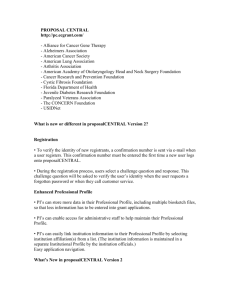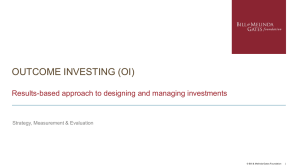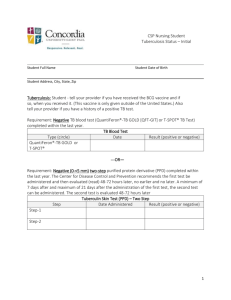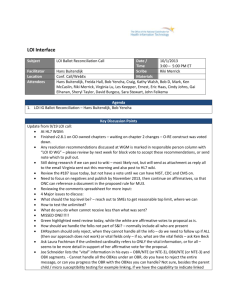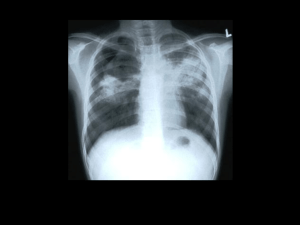The Bill & Melinda Gates Foundation will require that for each venue
advertisement
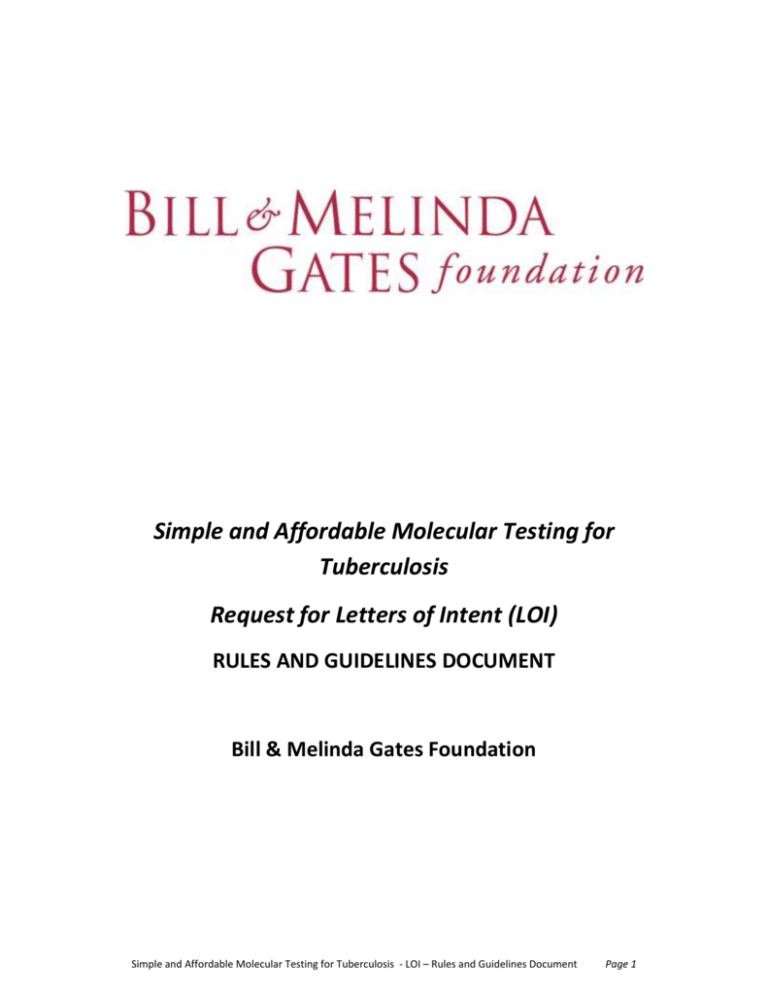
Simple and Affordable Molecular Testing for Tuberculosis Request for Letters of Intent (LOI) RULES AND GUIDELINES DOCUMENT Bill & Melinda Gates Foundation Simple and Affordable Molecular Testing for Tuberculosis - LOI – Rules and Guidelines Document Page 1 INTRODUCTION In the absence of an effective vaccine, the control of tuberculosis depends on detecting and treating cases to limit disease transmission. Despite recent significant progress in development of new tools, the diagnosis of tuberculosis remains problematic. Microscopy, which is poorly sensitive and cumbersome to perform, remains the only widely-available test in most settings. As such, many cases are missed and delayed detection is commonplace. Few patients in low-income settings have access to reference laboratories where culture (which is slow) or conventional nucleic-acid amplification testing (NAAT) (which is technically complex) might be performed. Appropriate platforms and assays are needed which greatly increase access of high-sensitivity molecular technologies, including reducing the cost and increasing the ability of these platforms to be used at lower-level laboratories, or, ideally, outside of the laboratory setting in health centers. PCR and other detection methods have been developed and commercialized to detect M. tuberculosis sequences in processed clinical materials from which nucleic acids have been extracted. Though commercial nucleic acid tests for tuberculosis have been available for nearly 20 years, they have had little impact in settings where the prevalence of disease is high, primarily because of the cost of the test and the technical complexity of processing the specimen and performing the assay. The operational utility of recently-launched automated tuberculosis nucleic acid assay test with integrated sample processing proved the feasibility of implementing molecular assays with appropriate design in peripheral laboratories of disease-endemic countries. The Bill and Melinda Gates Foundation now seeks to support the development of additional platforms and assays that have specific design characteristics that will make them implementable in developing countries at low cost. GOALS We seek to support the creation of a validated, low-cost, nucleic-acid assay for clinical TB detection on platforms capable of operation in rudimentary laboratories in low-resource settings. It is our intention for these assays to be to created and validated for use within 24-36 months. APPROACH Program Structure: The Gates Foundation provides funding to organizations and companies for the creation of products that will support our global health goals. The goal of this funding is not to create profit for the foundation, but rather to develop products and markets that will benefit our target populations and geographies. Though we not fund or invest in companies with the intention of profiting, the Foundation does structure agreements for project success, and does reserve rights to ensure products are available in the market to our target populations at low cost. Further detail is provided in the Rules and Guidelines section below. This request will make use of a two-step application process: Step 1: Interested parties will submit of a Letter of Intent to the Bill & Melinda Gates Foundation. A “Letter of Intent” or LOI, is a short outline of the approach companies are proposing to address the Simple and Affordable Molecular Testing for Tuberculosis - LOI – Rules and Guidelines Document Page 2 problem, along with a proposed budget, and a description of institutional capabilities. There is a seven (7) page limit on the LOI. A template will be provided for your institution to complete. Bill & Melinda Gates Foundation staff and other experts will evaluate the LOIs. Those applicants who are eligible and have projects of interest to the Foundation will be contacted directly and will be invited to submit a full proposal. Letters of intent must be submitted electronically, using the forms and process described at the following address: http://zhenduan.gongyi.qq.com Step 2: Institutions with successful LOIs will be invited by the Foundation to submit a full proposal. Further details and instructions will be provided at that time. Due to expected high volumes, the Bill & Melinda Gates Foundation will not provide individual critiques or feedback on why LOIs were not selected; It is our intention to solicit proposals from diagnostic developers to develop a TB assay on their platform for use in low-resource laboratories. Low resource laboratories, such as those found in Health Centers, have a limited amount of infrastructure available. The requirements listed in Table 1 reflect these limitations. Additional detail on our target laboratories can be found in the Maputo declaration (http://www.who.int/diagnostics_laboratory/Maputo-Declaration_2008.pdf), where we are targeting the level 1 health clinic. We intend to evaluate LOIs based on the capability of each institution, according to the criteria listed in Table 1, and in the Selection Process section. We plan to select a sub-set of proposers for further discussions, including on-site visits. Selection of a final awardee(s) will be subject to negotiation at the end of the selection process. The foundation may select none, one, or more proposers as a result of this request. Selection Timeline: Please note that all dates are subject to change. Wednesday, September 26, 2012: Final Request for Letters of Intent (LOI) released Friday, December 14, 2012 Letters of Intent (LOI) due February, 2013: Invitations for Full Proposals sent April, 2013: Application deadline for full proposal Project Activities/Proposal content Letters of Intent (LOIs) submitted for consideration must clearly state the key challenges, technical and otherwise, to the successful development of a diagnostic that meet the criteria in Table 1. The extent of these activities should be appropriate to the level of development of your platform and your assay. A brief work plan should be included which defines the activities envisioned to develop a tuberculosis assay, the number and type of staff that could be dedicated to the work, and timelines and milestones. To aid in our understanding and evaluation of your proposal, please budget for each objective for your project separately. A regulatory plan is not required at this stage, however we would encourage you to present your approach. Simple and Affordable Molecular Testing for Tuberculosis - LOI – Rules and Guidelines Document Page 3 A full description of your company and its institutional capacities should be included in the LOI, including annual revenues, number of employees, physical assets, and brief corporate history. The status of development of other assays developed or in development for the platform should be described. Please also provide an overview of your company’s relevant background intellectual property, as well as freedom to operate in the diagnostics space. Some examples of projects that would be considered within the scope of this Program: Improvement of an existing assay for tuberculosis Development of a tuberculosis assay on an existing platform Development of sputum processing methods or automation to complement a platform or assay Clinical trials for tuberculosis assays Projects that would be considered outside the scope of this Program: Development of a new molecular platform Applicants should indicate areas in which they do or do not have tuberculosis relevant capacity that is likely to be required, including access to bacterial strains and types of well-characterized clinical specimens. Please note that BL-2/3 capability may be required for TB sample processing and analysis; this capability should be considered as part of your proposed team. Capacities to conduct appropriate diagnostics clinical trials should also be noted. Proposals should include costs and plans for clinical trials. The program is currently intended to complete within 24-36 months from start. We are interested in accelerating the development of the product and will factor ability to accommodate this in with other selection characteristics. PLATFORM AND ASSAY CHARACTERISTICS The envisioned product is primarily intended to be a case detection tool at lower peripheral level laboratories. Expected cost of goods is critical, and work on a platform with expected consumable costs above those listed in the minimal column will not be supported. Assay specifications will depend on the specific technology, but some indicative characteristics are noted below. Applicants are not expected to provide data addressing each of these features, but should do so when preliminary data exist. Where data do not exist, please provide a rationale for how your platform or assay might perform for that characteristic. A detailed description of the technology should be included in the LOI that would allow estimation of the likelihood of meeting many of these targets. Another section that details known or potential obstacles should address any areas in which it is expected that the minimal criteria below will not be met. In particular, we would like detailed descriptions of the following areas: Description of platform and assay technologies proposed for this application Performance data for platform and related assays Description of regulatory status of platform Nucleic acid prep technologies utilized, and specific plans for sputum processing Simple and Affordable Molecular Testing for Tuberculosis - LOI – Rules and Guidelines Document Page 4 We would encourage you to provide data on your assay and platform in a manner that could be easily compared with Table 1 below. Table 1: Optimal and Minimal Product Characteristics for proposed tuberculosis diagnostic. Characteristic Optimal Minimal Cost of consumables (all) FOB < 4 USD < 8 USD Diagnostic specificity > 99 % >97% Reagent Kit stability 24m at 40oC, 70% humidity, incl. transport stress (48h at 50oC) 12m at 30oC, 70% humidity, incl. transport stress (48h at 50oC) Sample preparation and Assay processing (total steps) Integrated Thermal Tolerance of Platform/Assay Operation between 15°C and 40°C Minimal sample processing; no more than 3 – 5 steps (requiring operator intervention ) Operation between 15°C and 35°C Time to Market ≤ 24 Months ≤ 36 Months Time-to-result < 1 hour <2 hours Additional equipment required None Minimal (e.g. Heat block) Analytic sensitivity < 102 cfu/ml < 103 cfu/ml Analytic specificity No cross reactivity with other organisms including nontuberculous mycobacteria(NTM) No cross reactivity with other organisms including nontuberculous mycobacteria(NTM) Biosafety No need for biosafety cabinet, and direct disposal of consumable No need for biosafety cabinet, and autoclaved consumable Controls Internal full-process positive control and negative controls External controls Cost of instrumentation < 5,000 USD < 10,000 USD Diagnostic sensitivity > 98% smear-positive and 80% smear-negative patients 95% of smear-positive and 65% smear-negative patients Drug resistance screening Rifampin drug resistance testing via a separate cartridge with additional consumable cost (Reflex Testing) Electronics and data analysis Detection of rifampin, isoniazid, and fluoroquinolone resistance testing via a separate cartridge with additional consumable cost (Reflex Testing) Integrated Instrumentation Single device Sample prep + amp/detection Power None, optional battery or solar operation 110-220V AC current; DC power with rechargeable battery lasting Separate computer required Simple and Affordable Molecular Testing for Tuberculosis - LOI – Rules and Guidelines Document Page 5 Quantitation Semi-quantitative up to 8 hours of testing Qualitative Reagent integration All reagents in consumable < 4 external reagents Result capturing & documentation | Data display Electronic and printed, wireless transmission capable s). Electronic Sample type Sputum Sputum Throughput > 48 Samples per day, asynchronously 12 tests per 8-hour day Training & education needs <1/2 day, healthcare worker <1 day, trained laboratory technician Goal of Test Diagnosis of active pulmonary TB in adults and children for the purpose of treatment initiation; diagnosis of MDR TB by diagnosis of drug resistance to rifampin, isoniazid and fluoroquinolone; Liquid culture Diagnosis of active pulmonary TB in adults for the purpose of treatment initiation Equipment Small, portable or hand-held device Small, table-top device; portable device optional Additional 3rd party consumables None None, except for sample collection Cold Chain None required at any point in supply chain or storage None required at any point in supply chain or storage Clean Water Requirements None None Duration of valid sample (time from taking sample to insertion into device) 2 hours without refrigeration If running samples sequentially, 5 minutes; if batching without random access, 2 hours Waste/disposal requirements Disposal by incineration of infectious disease materials; simple trash for other materials Service/Maintenance No annually scheduled preventive maintenance required; device has capability to send an alert or to be detected remotely when it is not functioning properly. Mean time to failure of at least 12 months; 18 months preferred Incineration of infectious disease materials; recyclable or compostable plastics and consumables for other materials No on-site service and maintenance required; broken devices can be swapped with replacement device; device has capability to send an alert or to be detected remotely when it is not functioning properly. Software updates can be pushed out remotely over GSM and data networks. Mean time to failure of Reference Test Liquid culture Simple and Affordable Molecular Testing for Tuberculosis - LOI – Rules and Guidelines Document Page 6 18 months Calibration None required Minimal user calibration required Test/platform size/footprint/Portability Small, portable device (<2 kg) or handheld analyzer Small, table-top analyzer or portable device (<5 kg) Regulatory requirements Manufactured pursuant to GMP, ISO 13485:2003 certified and authorized for use by a regulatory authority that is a member of the Global Harmonization Task Force (GHTF); registered for in vitro diagnostic use. Simple test menu, integrated LCD screen; simple key pad or touch screen. Full data export over mobile phone network (data transmission can automatically select between GPRS or more advanced networks and GSM, based on available coverage). GPRS should be able to utilize the internet File Transfer Protocol (FTP) to transmit data. Data transfer should be initiated every 6 to 12 hours automatically by the analyzer. Data can be exported in a format compatible with HL7 standards, where appropriate. Instrument tracks and transmits QA data over time (e.g. identify shifts or trends). Manufactured pursuant to GMP, ISO 13485:2003 certified and authorized for use by a regulatory authority that is a member of the Global Harmonization Task Force (GHTF); registered for in vitro diagnostic use. Simple test menu; integrated LCD screen; simple key pad or touch screen Full data export over mobile phone network User Interface Data Export (for External Quality Assurance) ELIGIBILITY This request is intended to survey and engage with Chinese diagnostics companies. We encourage sharing this document with other Chinese companies that may have relevant capabilities. PROJECT SUPPORT The terms of funding, amount, and payment schedule will be determined through negotiations with the foundation. It is expected that each applicant would be able to demonstrate the amount of financial or in-kind support that they would be able to commit toward the development process, determined not only by the availability of existing resources but also by the potential commercial value of the resulting product(s). The Gates Foundation intends to provide direct financial support for assay, and (to a limited degree) platform development, analytic testing materials, clinical specimens, trial capacity, and analytics. We understand that many commercial entities may not have internal expertise or resources Simple and Affordable Molecular Testing for Tuberculosis - LOI – Rules and Guidelines Document Page 7 for specimens and clinical trial capacity for TB, we would encourage you to identify partners, and are willing to help identify partners in these areas, if required. As the price of the assay and instrument platform will be critical to adoption and utilization by developing countries, we are open to approaches to defer capital expenses and other investments as a means to lower Cost of Goods Sold (COGS). We would therefore suggest inclusion of different options in your proposal and how they may impact end-user costs or other critical parameters. This might include options for the following: Advance market commitments Capital investment to reduce manufacturing costs Initial platform or assay subsidies Proposers may also propose other approaches to lowering COGS. SELECTION PROCESS Awardees will be selected primarily on the overall likelihood of success, including: Strength and clarity of the proposal Judged ability of the testing platform to conform with user requirements including, importantly, estimated cost of goods of the envisioned product specification. Stage of platform and test development, and expected times to market Extent of preliminary data demonstrating the performance of hardware, reagents and consumables Financial and managerial soundness of the company and commercial attractiveness of the core technology Flexibility of the technology and capacity for menu expansion Expertise of the applicant company, and quality and range of current product line RULES AND GUIDELINES A. Application Instructions and Review Process Letters of Intent written in response to this request should be submitted no later than Friday, December 14, 2012. The Bill & Melinda Gates Foundation will evaluate each LOI using the criteria listed above. All applicants will be contacted directly by the Foundation, and those who submitted proposals found to be of specific interest will be invited to enter into further discussions by teleconference or face-to-face meetings. All applicants will be notified by email in a timely manner of any change to the dates for notification and proposal deadline. All dates are subject to change. The foundation may use external reviewers to assess the merit of LOI; however, final selection decisions will be made by the foundation. An invitation to submit a proposal does not guarantee that the foundation will award a grant to the applicant. The Foundation may amend or cancel this request at any time. B. Allowable Costs Simple and Affordable Molecular Testing for Tuberculosis - LOI – Rules and Guidelines Document Page 8 Grant funds may be used for the following costs: personnel, necessary travel, supplies, contracted services, sub-grants, and consultants. Please provide budget estimates according to these categories. Partial or full support for equipment may be requested subject to the circumstances described below. Please provide budget estimates according to these categories. Equipment: Use of any equipment purchased with grant funds is limited by law to charitable purposes for the depreciable life of the equipment. Please note that for many non- U.S. entities, U.S. tax law considerations may affect whether the Bill & Melinda Gates Foundation will permit purchase of equipment with a depreciable life that is greater than the grant period being requested. In such cases, leasing would be preferable. The Bill & Melinda Gates Foundation does not provide for indirect costs to for-profit organizations. Please review the foundation’s indirect cost policy at http://www.gatesfoundation.org/grantseeker/Documents/Indirect_Cost_Policy.pdf. C. Privacy Notice To help The Bill & Melinda Gates Foundation staff in their evaluation and analysis of projects, all proposals, documents, communications, and associated materials submitted to the Bill & Melinda Gates Foundation (collectively, “Submission Materials”) will become the property of the Bill & Melinda Gates Foundation and may be subject to confidential external review by independent subject matter experts and potential co-funders in addition to analysis by the Bill & Melinda Gates Foundation staff. Please carefully consider the information included in the Submission Materials. If you have any doubts about the wisdom of disclosure of confidential or proprietary information, the Bill & Melinda Gates Foundation recommends you consult with your legal counsel and take any steps you deem necessary to protect your intellectual property. You may wish to consider whether such information is critical for evaluating the submission, and whether more general, non-confidential information may be adequate as an alternative for these purposes. We respect confidential information we receive. Nonetheless, notwithstanding your characterization of any information as being confidential, the Bill & Melinda Gates Foundation may publicly disclose all information contained in Submission Materials to the extent as may be required by law and as is necessary for potential co-funders and external reviewers, such as government entities, to evaluate them and the manner and scope of potential funding consistent with appropriate regulations and their internal guidelines and policies. D. Warranty By providing any Submission Materials, the sender warrants the Bill & Melinda Gates Foundation that they have the right to provide the information submitted. Applicants with questions concerning the contents of their Submission Materials may contact the Bill & Melinda Gates Foundation at: Chinadx@gatesfoundation.org. E. Intellectual Property The Bill & Melinda Gates Foundation requires that you agree to use good faith efforts to conduct and manage the research, technologies, information and innovations involved in the Project in a manner that enables (a) the knowledge gained during the Project to be promptly and broadly disseminated, and Simple and Affordable Molecular Testing for Tuberculosis - LOI – Rules and Guidelines Document Page 9 (b) the intended product(s) to be made available and accessible at reasonable cost to the developing countries of the world. The foundation refers to this as “Global Access.” As part of the foundation’s review and evaluation of each full proposal, due diligence will be conducted with respect to each participant’s ability and commitment to manage intellectual property in a manner consistent with the stated scientific and charitable goals of the Bill & Melinda Gates Foundation. Due diligence activities may include inquiry into an applicant’s: 1) Freedom to operate (FTO) and ability to freely use and acquire needed background technology; 2) Commitment to promote the utilization, commercialization and availability of inventions for public benefit in developing countries In order to facilitate this due diligence process applicants are encouraged to provide information with respect to the items above in their submission materials. Applicants are also expected to make new information and materials known to the research and medical communities in a timely manner through publications, web announcements, progress reports to the foundation, and other appropriate mechanisms. Moreover, a condition for the award of a grant may be the grant of certain sub-licensable intellectual property rights to the Bill & Melinda Gates Foundation. Such a requirement may be made if it is determined that such rights are the best way to ensure that the Global Access requirements will be met. These concepts may be discussed at some length with the applicants invited for further discussions, and will be addressed (to the extent appropriate) within each final grant agreement. The Global Access Strategy will also include provisions defining these concepts. RESEARCH ASSURANCES The Bill & Melinda Gates Foundation will require that for each venue in which any part of the project is conducted (either by your organization or a subgrantee or subcontractor) all legal and regulatory approvals for the activities being conducted will be obtained in advance of commencing the regulated activity. The foundation will further require you to agree that no funds will be expended to enroll human subjects until the necessary regulatory and ethical bodies’ approvals are obtained. A. Research Involving Human Subjects. You agree that no funds will be expended to enroll human subjects in any research project subject to Institution Review Board (IRB) or independent ethics committee (IEC) approval until such approval has been obtained for each site. B. Clinical Trials A condition of this grant is your agreement that the appropriate Institutional Review Boards (“IRBs”) and ethical committees will review and approve the clinical protocols prior to trial initiation. You further agree to conduct clinical trials associated with the project under the generally accepted principles of “Good Clinical Practices” as defined by the International Conference on Harmonization (ICH) E-6 Standard, the United States Food and Drug Administration (FDA) or the European Agency for the Evaluation of Medicinal Products (EMEA), as applicable. You acknowledge and agree that, as between you and the foundation, you take and will have full responsibility for all compliance, data safety, monitoring, and audit requirements of the relevant regulatory agencies, both for yourself and all other sites included in the project, including those activities conducted through subgrants, subcontracts or other collaborative efforts. You acknowledge and agree that any activities by the foundation as the Simple and Affordable Molecular Testing for Tuberculosis - LOI – Rules and Guidelines Document Page 10 grantor funding the Project, including its review of the Proposal or suggested modifications to the Project, does not modify the provisions of this paragraph or constitute the basis for any claim by you against the foundation. C. Coverage for all Sites You agree that for each venue in which any part of the Project is conducted (either by your organization or a subgrantee or subcontractor) all legal and regulatory approvals for the activities being conducted will be obtained in advance of commencing the regulated activity. You further specifically agree that no funds will be expended to enroll human subjects until the necessary regulatory and ethical bodies’ approvals are obtained. D. Regulated Activities The coverage requirements set forth in the preceding paragraph include but are not limited to regulations relating to: research involving human subjects; clinical trials, including management of data confidentiality; research involving animals; research using substances or organisms classified as Select Agents by the U.S. Government; use or release of genetically modified organisms; research use of recombinant DNA; and/or use of any organism, substance or material considered to be a biohazard, including adherence to all applicable standards for transport of specimens, both locally and internationally, as appropriate. As applicable, regulated activities and their documentation are to be conducted under the applicable international, national, and local standards. Documentation of research results should be consistent with regulations and the need to establish corroborated dates of invention and reduction to practice with respect to inventions where this is relevant. E. Institutional Review Board (IRB) Approval You agree to obtain the review and approval of all final protocols by the appropriate IRBs and ethical committees prior to enrollment of the first human subject and when using human material. A similar provision applies to Institutional Animal Care and Use Committee approval of studies involving animals, and Institutional Biosafety Committee for biohazards and recombinant DNA. You agree to provide prompt notice to the foundation if the facts and circumstances change regarding the approval status of the IRBs or ethical committees for any final protocol(s). F. Provision of Care for Human Subjects Research In keeping with “Good Clinical Practice” standards, you will disclose to subjects and the IRBs what care and/or referrals will be available through participation in the study. Institutional policies regarding what care will be provided to personnel who are injured as a result of their work on the Project should similarly be developed, approved and implemented with notice to the employees. G. Use of Animals in Research You agree to be responsible for the humane care and treatment of animals in projects supported in part or whole by Gates Foundation funds; and to adhere to the official guidelines for animal research applicable in the country and locality where the trial is being conducted. No grant funds may be expended on studies involving animals until all requisite approvals are in place, and notification to that effect has been provided to the foundation. For purposes of this provision, an “animal” is defined as any live, vertebrate animal used or intended for use in research, research training, experimentation, biological testing or for related purposes. In the case of multi-national collaborations, the standards of each country may be followed, as long as (i) differences do not interfere with the design and analysis of Simple and Affordable Molecular Testing for Tuberculosis - LOI – Rules and Guidelines Document Page 11 the Project, and (ii) regulations in your institution and host country do not conflict with the management of the Project. You agree to take responsibility for compliance of all subgrantees or subcontractors (if any) with the appropriate animal welfare laws, rules and regulations. You must report annually as a part of your progress report that the activities are being conducted in accordance with applicable laws in each respective venue (e.g., U.S. grantees must use the U.S. Public Health Service standards. Non-U.S. grantees may cite national laws or the CIOMS International Guiding Principles for Biomedical Research Involving Animals (see http://www.cioms.ch/publications/guidelines/1985_texts_of_guidelines.htm) if there is not a relevant national standard. Simple and Affordable Molecular Testing for Tuberculosis - LOI – Rules and Guidelines Document Page 12

